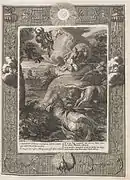Myia (mythology)
In Lucian of Samosata's works, Myia (Greek: Μυῖα, translit. Muîa, lit. "fly") is a young girl who fell in love with Endymion and was transformed by the lunar goddess Selene into a fly, a small insect bearing her name.
Etymology
The ancient Greek noun μυῖα translates to 'fly',[1] and is derived from the Proto-Indo-European root *mus-ih2, thus being cognate with the Latin musca.[2]
Mythology
In his satirical work Praising a Fly (Muscae Encomium),[3] Lucian of Samosata related the—otherwise unattested—myth of Myia, an exceedingly fair but also very chatty young maiden who fell in love with Endymion, a very handsome mortal man who had been granted immortality via eternal slumber. With her endless chatter Myia would wake up Endymion, irritating him and enraging the moon goddess Selene, his lover.[4] Selene then transformed the talkative girl into a fly, who annoys sleeping people to this day, in memory of her love and her deeds in her previous life.[5][6][7][8] An ancient Greek proverb was μυίης θάρσος (literally 'the fly's boldness'), said for those who were of excessive boldness.[1]
Similarly to the myth of the boy Alectryon (also surviving in the works of Lucian) Myia's story is an aetiological myth which nonetheless does not link its protagonist to a specific Greek place or lineage, with a starting point in another, more popular myth, rather than an animal-based cult.[7] Likewise, it is impossible to say whether the myth is just an invention of Lucian's or a genuine popular fable about animals.[7]
See also
Notes
- Liddell & Scott 1940, s.v. μυῖα.
- Beekes 2010, p. 976.
- Hünemörder, Christian (2006). "Fly". In Cancik, Hubert; Schneider, Helmuth (eds.). Brill's New Pauly. Translated by Christine F. Salazar. Hamburg: Brill Reference Online. doi:10.1163/1574-9347_bnp_e412950. Retrieved September 30, 2023.
- Wright, M. Rosemary. "A Dictionary of Classical Mythology: Summary of Transformations". mythandreligion.upatras.gr. University of Patras. Retrieved September 30, 2023.
- Lucian, The Fly 10
- Lucian 2022, p. 13.
- Forbes Irving 1990, p. 315.
- Lucian & C. D. N. Costa 2005, p. 5.
References
- Beekes, Robert S. P. (2010). Lucien van Beek (ed.). Etymological Dictionary of Greek. Leiden Indo-European Etymological Dictionary Series. Vol. ΙΙ. Leiden, the Netherlands: Brill Publications. ISBN 978-90-04-17419-1.
- Forbes Irving, Paul M. C. (1990). Metamorphosis in Greek Myths. Clarendon Press. ISBN 0-19-814730-9.
- Liddell, Henry George; Scott, Robert (1940). A Greek-English Lexicon, revised and augmented throughout by Sir Henry Stuart Jones with the assistance of Roderick McKenzie. Oxford: Clarendon Press. Online version at Perseus.tufts project.
- Lucian (March 19, 2022). Florilegium of Lucian's Philosophical Finesse and Irreverent Wit. Philaletheians UK.
- Lucian, The Fly in Phalaris. Hippias or The Bath. Dionysus. Heracles. Amber or The Swans. The Fly. Nigrinus. Demonax. The Hall. My Native Land. Octogenarians. A True Story. Slander. The Consonants at Law. The Carousal (Symposium) or The Lapiths. Translated by A. M. Harmon. Loeb Classical Library 14. Cambridge, MA: Harvard University Press, 1913.
- Lucian; C. D. N. Costa (2005). Lucian: Selected Dialogues. Oxford, New York: Oxford University Press. ISBN 978-0-19-925867-3.
.jpg.webp)
.jpg.webp)
